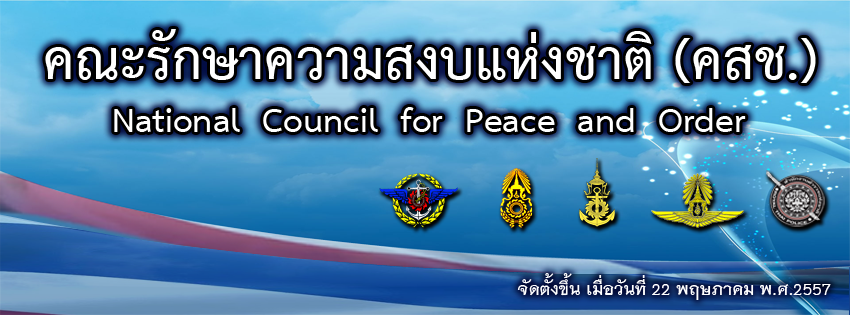
The National Council for Peace and Order (NCPO) is the official name of the junta government in Thailand. Photo from NCPO Facebook page
A new Citizen Lab study measuring website accessibility in Thailand from May 22 to June 26 of this year confirmed that 56 URLs had been blocked in the country. Several online news outlets (local and international) critical of the coup were censored, along with social media accounts that shared supposedly “anti-coup” messages, and circumvention tools.
Although Internet filtering has been a concern under various Thai governments, elected or otherwise, these practices by government officials have been inconsistent until recently. Most filtering targeted content related to security and social issues, such as gambling, pornography and terrorism. But following the introduction of the Computer-Related Crime Act of 2007, the deadly mix of this and Lese Majeste (anti-royal insult law) charges resulted in a sharp rise of persecution on political grounds. As the political conflict intensified in Thailand, opposition figures and groups were increasingly targeted online. And state-owned ISPs like the TOT were found to have done more filtering than a private ISP like True Corporation.
After the Royal Thai Army launched the present coup on May 22 of this year, military leaders vowed to be tougher than the most recent coup government of 2006. General Prayuth Chan-ocha, the coup leader and the current prime minister, has said Thailand needed “extra-strength” medicine to cure itself from the political malaise that has plagued the country for a decade.
The previous coup regime appeared not to take the online world seriously, unlike the current regime, which has exhibited more direct action in enforcing broader and stricter information controls.
The findings from the Citizen Lab’s network measurement tests show that blocking in the days following the coup was “highly dynamic.”
…after the first websites were found blocked, subsequent test results showed new websites being blocked on a daily basis. The technical methods used to implement blocking were also dynamic, as the blockpages displayed and services used to host them also changed regularly.
Researchers also found that different ISPs filtered different content. “Combined, these changes reflect a volatile environment in which the implementation of Internet filtering has shifted rapidly as the coup develops,” they wrote.
To increase consistency in filtering compliance, the military summoned the executives of ISP providers in Thailand to a meeting where they asked for “cooperation” in surveillance. Internet providers were initially required to submit a list of URLs to be blocked within one hour to the Ministry of ICT, Cyber Police, or the National Broadcasting and Telecommunications Commission.
And Internet filtering has proliferated in tandem with other measures to control information. Traditional media like TV, radio stations, cable and newspapers were placed under heavy scrutiny and censorship by the junta when it comes to political news.
The new government also tried, but failed, to gain cooperation from Internet giants like Facebook, Twitter and Google or the LINE chat app. Unable to secure backing from key social media platforms, the military appears to be using ethically questionable methods to harvest net users’ email addresses, as reported by the Thai Netizen Network.
The Thai junta has thus far kept its promise to toughen its stance on cyber information controls. The recent coup may have, unintentionally, provided more consistency and tools for the state to regulate and monitor the cyber world.




4 comments